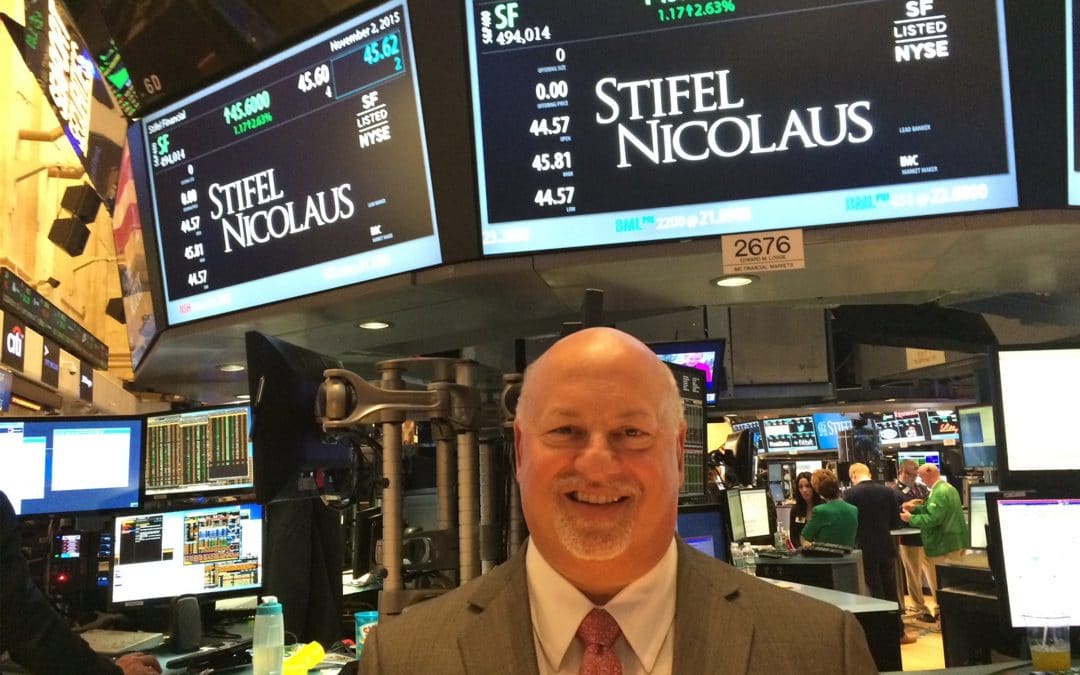Success through service
How Stifel Executive Vice President and Vice Chairman Ben Plotkin’s philosophy of listening to the customer propelled him into a 35-plus year career in investment banking.
Ben Plotkin (BSBA ’76) fondly remembers his teenage years working at his father’s lumber and hardware store in Miami in the 1960s. It was during the shifts he worked every weekend that he learned the business philosophy he’d carry forth throughout his career – if you listen to the customer, they will reward you.
“I grew up in a culture where the customer is king,” he said. “That mindset forces you to listen to the customer. We’d call this having emotional intelligence today, but it’s the idea that good listeners get repeat customers if you get them what they need.”
It was with this viewpoint that Plotkin was able to help his family reach their daily sales goal during his shift as manager on Sundays – his first entrepreneurial success. In the years since then, listening to the customer has continued to reward Plotkin, who has helped clients for over 35 years in the financial services industry.
After graduating from the University of Florida with a degree in economics and earning his law degree from Georgetown University, Plotkin started his career at a law firm specializing in finance and securities, the seemingly perfect convergence of his interests. But for Plotkin, a believer that a career path shouldn’t be too planned, it was a headhunter’s call in 1987 that would lead him to investment banking and the company he’s worked for the majority of his career.
After 10 years in investment banking, Plotkin moved into a CEO role for the same public firm. He took the company private and later merged with his current company, Stifel, a wealth management firm and investment bank. Today, Plotkin serves as Executive Vice President and Vice Chairman at Stifel, a global publicly held firm with over 8,500 employees.
While his days are usually filled with thinking about the firm’s strategy, risk management and, true to his roots, making calls to customers to see how he can help them, Plotkin says his days are anything but routine.
“It’s constant change,” he said. “I laugh that people think banking is boring. Yes, the idea and services provided appear to be the same, but my work constantly evolves with a regulatory overlay.”
The latest revolution Plotkin said we’re beginning to see is in financial technology, or fintech as it’s commonly referred to. The interaction between traditional banking, fintechs and regulators will redefine financial institutions in the near future, he noted.
“I haven’t seen the pace of change this fast in financial institutions since the deregulation of rates back in the 80s,” he said.
Even with the need to be on the lookout for what’s on the horizon, Plotkin always comes back to listening to help people as his guiding principle.
“I want to have the most positive influence on people,” he said. “As my role has evolved, I’ve become more of a risk manager and mentor, so that’s a way I can help my people.”
Having been through multiple crashes, from 1987’s Black Monday to the dotcom bubble to the Great Recession and today’s pandemic induced economic hardships, Plotkin has amassed a number of insights that his clients and employees can rely on for guidance.
“I’ve seen the movie enough times that I can help others in my company prevent losses,” he said.
As for ways he can help Warrington students, in addition to giving his time and insights as a member of Warrington’s Business Advisory Council, Plotkin offered these pieces of advice. First, learn to be a reader.
“I didn’t just rely on the books my professors provided,” Plotkin said. “I read a lot of books by successful entrepreneurs and biographies. I suggest that early on, before you make any decisions on careers, learn about how other people built the mental toughness necessary to be successful.”
His second piece of advice is one that goes back to his own college experience – be open minded about your future.
“I don’t think you want to work too rigid of a plan,” he said. “Get into an environment where you can show your skillset to successful people. If you put yourself in a situation with quality people, opportunities will come.”
Outside of his professional career, Plotkin dedicates his time to three important passions – organizations related to Israel, his family and his favorite pastime, boating.
The son of a Jewish refugee from Nazi Germany, Plotkin works with various organizations on building relationships with businesses in Israel as well as giving advice to CEOs through the Young Presidents’ Organization (YPO) or directly through client engagement.
When he’s not sharing his wisdom with business leaders, Plotkin enjoys visiting with his sons, one who lives with his family in Israel and the other in Brooklyn, as well as boating with his wife of 41 years and UF alumna, Sheila. While Plotkin and Sheila didn’t meet until after their time at UF when they were both living in Washington, D.C., they didn’t realize how close they were while they were students.




